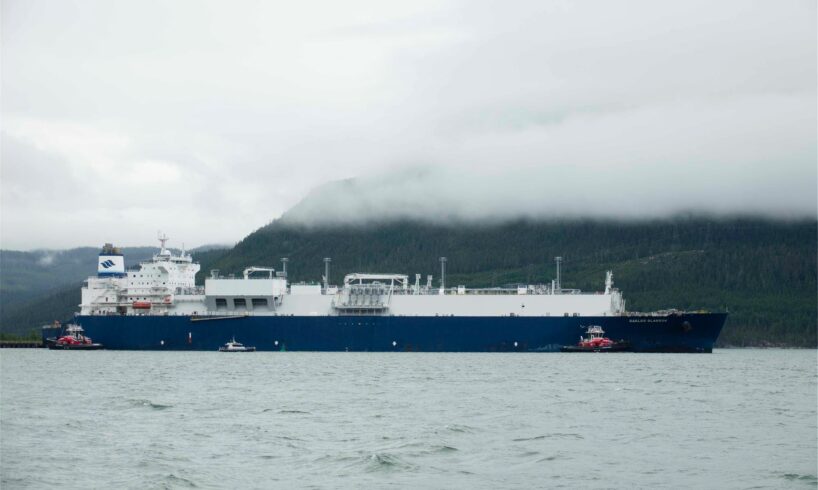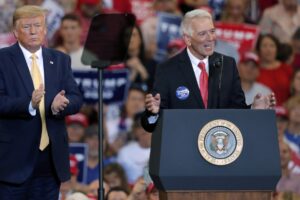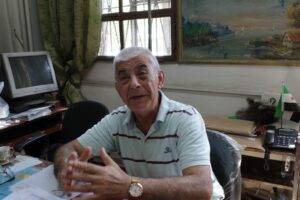
Open this photo in gallery:
The LNG tanker GasLog Glasgow, carrying LNG Canada’s first export of liquefied natural gas to Asia, leaves the harbour in Kitimat, B.C., June 30.Robin Rowland/The Globe and Mail
A massive tanker ship, the Diamond Gas Crystal, departed Kitimat this week loaded with tonnes of liquefied natural gas bound for customers in Asia. It was the 16th tanker load since production began at LNG Canada in the summer.
Once Phase 1 is in full swing, the facility will be filling 170 tankers annually with a product that is classified, in the event of a marine spill, as noxious and hazardous. The ships’ route to open water winds through a series of channels for almost 300 kilometres, a rugged and remote section of the coast known for fierce winter storms.
All of this is taking place with the blessing of Coastal First Nations, who strongly oppose tankers carrying heavy oil in these waters.
While not universal, there is broad Indigenous support for LNG projects in B.C. The 297-metre-long Diamond Gas Crystal was named in honour of an Indigenous leader who helped secure LNG development in Kitimat, former Haisla chief councillor Crystal Smith.
But these multibillion-dollar investments are at risk, B.C. Premier David Eby says, if Alberta succeeds in persuading Ottawa to lift the current oil tanker ban on the North Coast.
Premier Danielle Smith plans to make an application to the federal government to build a new pipeline that would carry oil to a Northern B.C. port. To make that work, she wants Ottawa to sweep aside “nine bad laws” including the North Coast oil tanker ban.
The Decibel podcast: How a new pipeline could test Canadian unity
On Friday, Prime Minister Mark Carney would not say if he will lift the tanker ban for Alberta. “It depends,” he told reporters. He said his government is interested in nation-building projects that can involve clean or conventional energy, but they need to be consistent with Ottawa’s climate plans and require the participation of Indigenous peoples.
Mr. Eby argues that Alberta’s pipeline plan will not meet federal objectives because it is not viable, and it jeopardizes significant private-sector investments that B.C. is poised to secure.
“Please don’t upset the fragile consensus that we have currently – that I hope to make durable and long term – for resource development in British Columbia and Canada with a project that doesn’t actually exist,” Mr. Eby told reporters in Victoria.
That fragile consensus between Coastal First Nations, local communities and major resource developers applies to tens of billions of dollars’ worth of projects that are nearing final investment decisions.
It has already resulted in the construction of LNG Canada Phase 1, Canada’s single biggest private-sector investment to date. If Phase 2 is built, it would double the capacity.
In mining and natural gas, B.C.’s resource sector is poised for a major expansion.
Ksi Lisims LNG is close to approval. Two B.C. projects are already under construction: Woodfibre LNG, near Squamish, and Cedar LNG, in Kitimat. British Columbia also has a string of new critical-mineral mines on the books, and a proposal for a second container terminal at the Port of Prince Rupert, Canada’s third-busiest port and the closest West Coast port to Asia.
Opinion: In the national pipeline debate, hypocrisy knows no bounds
Coastal First Nations president Marilyn Slett, however, has tied consent for some of those projects to the existing ban on oil tankers on the North Coast.
“Premier Smith’s continued talk of oil pipelines and tankers, and the risk of a catastrophic oil spill in B.C.’s coastal waters, is not nation-building. In fact, it risks the goodwill and support of First Nations for more realistic and economically valuable nation-building projects in B.C. and beyond,” Ms. Slett said in a statement. Her organization represents nine First Nations whose traditional territories line the North Pacific Coast.
Ms. Slett is the elected chief of the Heiltsuk First Nation, whose community has been fighting for greater control over marine traffic since a tugboat carrying oil ran aground in its territory in 2016. The incident resulted in the closing of seafood harvesting that the Heiltsuk depend on.
She noted that if the current LNG projects on the table are approved, the coast will see a huge increase in marine traffic. Allowing oil tankers on top of that, she said, would provoke a backlash from Indigenous communities.
“Adding oil tankers to this already crowded route, which has some of the world’s most treacherous waterways, is irresponsible and unsafe,” she said.
For decades, resource development in British Columbia has faced significant hurdles because of uncertainty over Aboriginal title. Few treaties have been signed, making Indigenous consent for projects a crucial factor.
Adrian Dix, B.C.’s Minister of Energy and Climate Solutions, says his government has been able to secure major private-sector investments by working with First Nations. But a dispute over oil-tanker traffic could easily discourage investors.
He noted that Ksi Lisims LNG and LNG Canada Phase 2 are close to final investment decisions. “We’re making enormous progress,” he said in an interview.
Opinion: Danielle Smith’s pipeline ransom note to Mark Carney is using Canada as her hostage
“So, when people present a project that has no proponent and has just a political plan, it obviously takes away from all that enormous consensus and work that we’re doing that benefits the country, and these are real projects.”
The Alberta Premier was in Ottawa this week to set out her demands that she says are critical to holding Confederation together. Ms. Smith wants Ottawa to put her oil pipeline proposal on its list for consideration by the Major Projects Office, which has the power to fast-track approvals.
She also wants Mr. Carney to clear away policy and laws that she says are holding back investments in the oil sector. She set a deadline for agreement by the time Winnipeg holds the CFL’s Grey Cup game on Nov. 16. In the meantime, she has told Mr. Eby to stay out of the debate, saying it is “unconstitutional” for him to interfere in federal jurisdiction.
Even if Mr. Carney agrees to meet Alberta’s demands in the next five weeks, and the Major Projects Office agrees to fast-track the project, Indigenous opposition can still pose a significant hurdle.
Texas oil giant Kinder Morgan walked away from the Trans Mountain pipeline project because of the endless obstacles raised by First Nations. Canada ended up taking over the project and completing it.
With a report from Bill Curry in Ottawa





